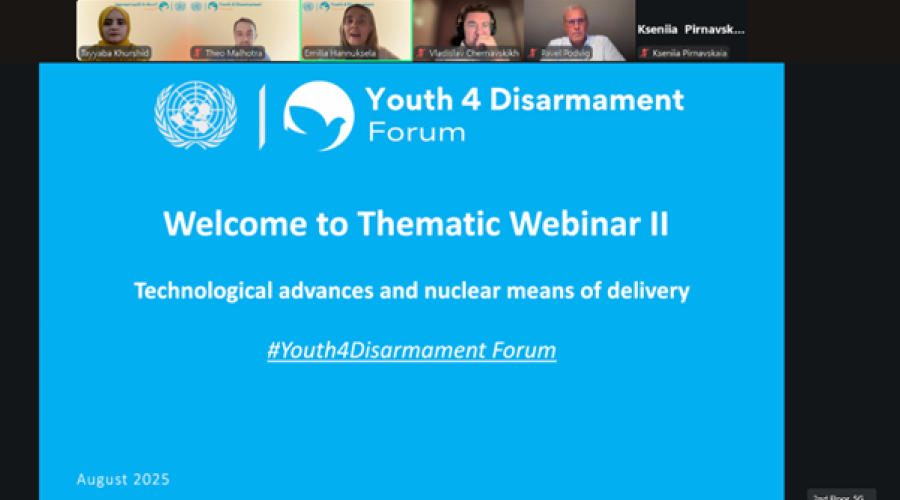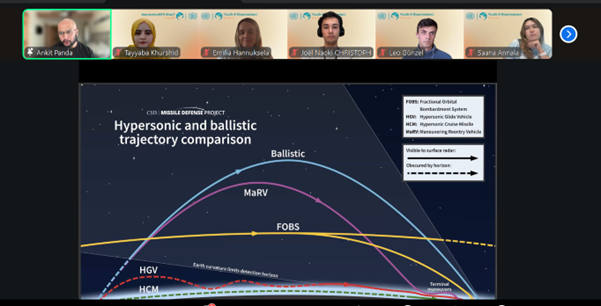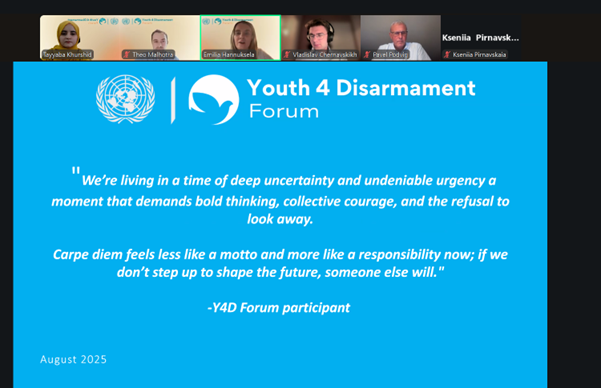News story
Second Y4D Forum webinar explores technological advances and nuclear means of delivery

On August 19th 2025, the third and final Youth4Disarmament (Y4D) Forum preparatory webinar engaged participants in the ever-complex challenge of managing the impact of technological developments on evolving nuclear weapons delivery systems.
The webinar opened with an expert panel discussion on technological advances and nuclear weapons delivery systems, moderated by Joël Naoki and Leo Günzel. Ankit Panda, Stanton Senior Fellow in the Nuclear Policy Program at the Carnegie Endowment for International Peace, started the discussion by diving into the evolution of nuclear weapons delivery systems from the start of the atomic age in 1945 to today. From the transition to the missile age to the emerging questions of today’s security landscape, Panda described the security concerns and priorities driving technological development in the delivery system arena. He highlighted the inadequate response by the international community to these emerging trends and technological advances and encouraged greater engagement.

Y4D Forum participant Tayyaba Khurshid, Research Officer at Center for International Strategic Studies AJk, spoke next, providing a regional perspective through the exploration of the impact of evolving nuclear weapons delivery systems in South Asia. She described the major challenges facing South Asia as the destabilizing impact of global technologies on the region, as well as the stark technological disparities on the global level and within the region itself, feed into the intense existing stability-instability paradox. Emerging technologies are intensifying strategic competition in South Asia and shifting security priorities. She believed that the real test will be whether states choose to treat these technologies as exclusively instruments of competition or recognize the potential for cooperation and engagement.
Zooming out from the regional perspective, Pavel Podvig, Senior Researcher in the Weapons of Mass Destruction (WMD) Programme at the United Nations Institute for Disarmament Research (UNIDIR), touched upon what the international community can do to address these technological challenges in terms of arms control, disarmament and verification. His advice was simple: stay calm. The international community should look critically at these new technologies and work together to find a common understanding of what these systems can and, perhaps more importantly, cannot do. We must recognize that just because new technologically advanced ideas around delivery systems are introduced or proposed, it does not mean that they will come to the fore with a military mission. The reality is that many of these tools serve a political or psychological rather than military purpose. When evaluating new and evolving nuclear weapons delivery systems, we must ask ourselves: do these tools actually change anything, and how can we form a common understanding around their purpose and/or capabilities?
Following the panelist presentations, various speakers provided valuable reflections on the issue of responsibly engaging with emerging technologies. The speakers included George-Wilhelm Gallhofer, Deputy Director for Disarmament, Arms Control and Non-Proliferation at the Austrian Foreign Ministry Braulio Fausto, Adviser for Disarmament and Non-Proliferation at Permanent Mission of Mexico to the United Nations, and Vladislav Chernavskikh, Research Assistant in the Stockholm International Peace Research Institute (SIPRI) WMD Programme.

Youth Shape Actionable Recommendations during Breakout Sessions
During a breakout session, six groups consisting of the upcoming Y4D Forum participants discussed practical steps to translate expert insights and lived experiences into policy recommendations that highlight the creation of guardrails and a common understanding to address challenges and opportunities presented by emerging technological developments.
The first group, represented by Leo Günzel: suggested finding common areas for cooperation through treaty creation, such as nuclear terrorism and Artificial Intelligence.
The second group, represented by Emma Sandifer: proposed to create regional understandings of the challenges and opportunities presented by the integration of Artificial Intelligence into the Nuclear Command, Control, and Communications process via the formation of regional forums.
The third group, represented by Vivianne Manlai: stressed the need to address the potential lack of human oversight over nuclear weapons decision making by centering mandatory and meaningful human oversight.
The fourth group, represented by Dina Tawfik: recommended confidence building measures as it relates to the integration of Artificial Intelligence into the Nuclear Command, Control, and Communications process by requiring a human-in-the-loop element.
The fifth group, represented by Ulysse Richard: reiterated the need to address shrinking decision timelines caused by the integration of Artificial Intelligence into the Nuclear Command, Control, and Communications process by investing in the human element through operator training or multilayered human oversight.
The sixth and final group, represented by Siri Jansson: promoted the need to address threats posed by inclusion of AI in nuclear command, control, and communications systems by establishing consultations for norms development managing perceived threats by creating platforms for discussion, and reaching agreement on what meaningful human control means in practice.
The ideas generated in these discussions will feed into the Y4D Forum Outcome Document, which will be launched during the in-person Forum at the UN Headquarters in October.

Follow the journey towards the first-ever Youth4Disarmament Forum on Instagram @youth4disarmament and add your voice using #UNYouth4DisarmamentForum.
For more information, contact the UNODA Youth4Disarmament Team at youth4disarmament@un.org.
Co-authored by UN Youth4Disarmament Forum participants:
Emma Sandifer, Program Coordinator at the Center for Arms Control and Non-Proliferation and Council for a Livable World
Yorgo El Moubayed, Program Coordinator, International Genetically Engineered Machine (iGEM) Foundation / Tech Consultant, International Biosecurity and Biosafety Initiative for Science (IBBIS)
Tayyaba Khurshid, Research Officer Center for International Strategic Studies, AJK. She is member of Emerging Voices Network BASIC UK, a NESA Alumnus and a 2024 Gaming for Peace fellow.